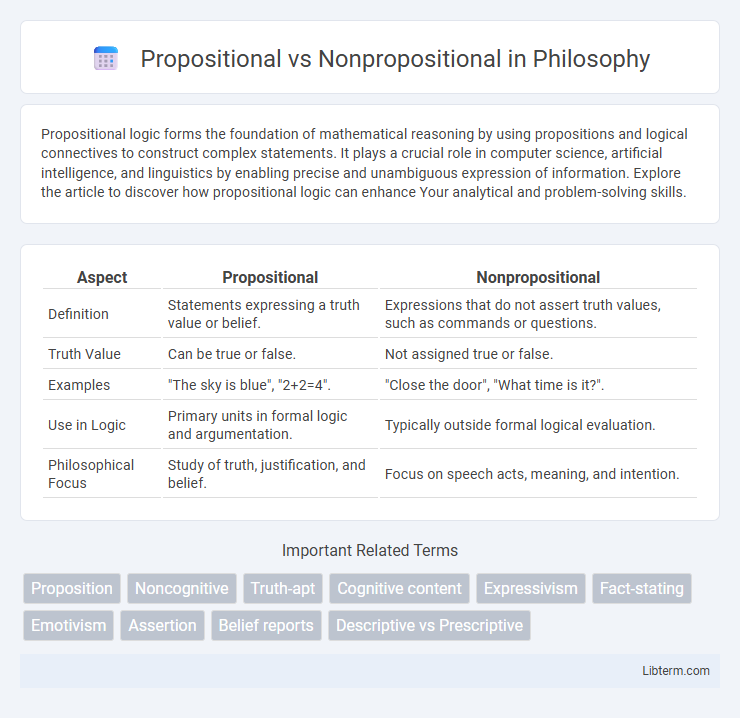Propositional logic forms the foundation of mathematical reasoning by using propositions and logical connectives to construct complex statements. It plays a crucial role in computer science, artificial intelligence, and linguistics by enabling precise and unambiguous expression of information. Explore the article to discover how propositional logic can enhance Your analytical and problem-solving skills.
Table of Comparison
| Aspect | Propositional | Nonpropositional |
|---|---|---|
| Definition | Statements expressing a truth value or belief. | Expressions that do not assert truth values, such as commands or questions. |
| Truth Value | Can be true or false. | Not assigned true or false. |
| Examples | "The sky is blue", "2+2=4". | "Close the door", "What time is it?". |
| Use in Logic | Primary units in formal logic and argumentation. | Typically outside formal logical evaluation. |
| Philosophical Focus | Study of truth, justification, and belief. | Focus on speech acts, meaning, and intention. |
Understanding Propositional and Nonpropositional Knowledge
Propositional knowledge involves understanding facts expressed as declarative statements that can be true or false, such as "The sky is blue." Nonpropositional knowledge encompasses skills, abilities, and experiences that cannot be easily articulated, like riding a bicycle or recognizing a face. Differentiating these types enhances cognitive science and epistemology by clarifying how knowledge is acquired, processed, and applied in various contexts.
Defining Propositional Knowledge
Propositional knowledge, often defined as knowledge that can be expressed in declarative statements or propositions, involves understanding facts and truths that can be verified or falsified. It contrasts with nonpropositional knowledge, which includes skills, know-how, or experiential understanding that cannot be fully captured by language or declarative sentences. Defining propositional knowledge centers on its nature as knowledge that "knows that" something is the case, grounding it in explicit cognitive content that supports logical reasoning and communication.
Defining Nonpropositional Knowledge
Nonpropositional knowledge refers to understanding gained through experience, intuition, or skills that cannot be explicitly stated as facts or propositions. Unlike propositional knowledge, which is expressed through declarative statements and logical truths, nonpropositional knowledge encompasses tacit know-how, sensory perception, and embodied cognition. This type of knowledge is often demonstrated through action, such as riding a bike or recognizing emotions, rather than verbal explanation.
Key Differences Between Propositional and Nonpropositional
Propositional knowledge involves statements that can be true or false, such as facts and information expressed in declarative sentences, while nonpropositional knowledge pertains to skills, experiences, or know-how that cannot be easily articulated in factual terms. The key difference lies in propositional knowledge being explicit and verifiable through language, whereas nonpropositional knowledge is often tacit, experiential, and implicit. This distinction affects how knowledge is communicated, with propositional knowledge suitable for formal teaching and documentation, and nonpropositional knowledge requiring practice and personal engagement for mastery.
Examples of Propositional Knowledge
Examples of propositional knowledge include knowing that Paris is the capital of France, understanding that water boils at 100 degrees Celsius, and recognizing that the Earth orbits the Sun. This type of knowledge is characterized by facts or information that can be expressed in declarative statements and evaluated as true or false. Propositional knowledge contrasts with nonpropositional knowledge, which involves skills or know-how rather than factual statements.
Examples of Nonpropositional Knowledge
Nonpropositional knowledge includes skills, abilities, and know-how, such as riding a bicycle, playing a musical instrument, or speaking a language fluently. Unlike propositional knowledge, which involves factual statements like "Paris is the capital of France," nonpropositional knowledge is often tacit and experiential. This form of knowledge is critical in practices like craftsmanship, artistic performance, and physical coordination where procedural understanding cannot be fully articulated in declarative terms.
Importance in Epistemology
Propositional knowledge, which involves knowing that a statement is true or false, forms the foundation of epistemology by enabling the analysis of justified belief and truth conditions. Nonpropositional knowledge, such as knowing how to perform a skill or being acquainted with a person, challenges traditional epistemic theories by highlighting the limitations of propositional frameworks. Understanding the distinction between propositional and nonpropositional knowledge is crucial for developing comprehensive epistemological models that account for both factual information and practical expertise.
Applications in Everyday Life
Propositional knowledge, which involves facts and information that can be explicitly stated and verified, is crucial in decision-making processes such as following instructions or understanding laws. Nonpropositional knowledge, encompassing skills and abilities like riding a bike or playing an instrument, is essential for performing daily tasks that require practice and experience. Both types of knowledge complement each other in activities like cooking, where understanding a recipe (propositional) is paired with the physical skill of preparation (nonpropositional).
Criticisms and Debates
Criticisms of propositional attitudes center on their reliance on truth-conditional content, which some argue oversimplifies complex mental states and fails to account for qualia and contextual nuances. Nonpropositional theories face debates regarding their explanatory power, with critics claiming they lack the systematic structure propositional frameworks provide for understanding belief, desire, and intention. Ongoing discussions focus on whether mental representations are better modeled as discrete truth-evaluable propositions or as dynamic, context-dependent processes beyond propositional form.
Summary and Final Thoughts
Propositional knowledge refers to facts and information that can be explicitly stated and verified, such as "Paris is the capital of France," while nonpropositional knowledge involves skills and experiences that are difficult to articulate, like riding a bicycle or recognizing a face. Understanding the distinction aids in differentiating between knowing-that and knowing-how, emphasizing the cognitive processes behind factual understanding versus practical expertise. This differentiation is crucial in fields like epistemology, education, and artificial intelligence, where methods of acquiring and demonstrating knowledge vary significantly.
Propositional Infographic

 libterm.com
libterm.com